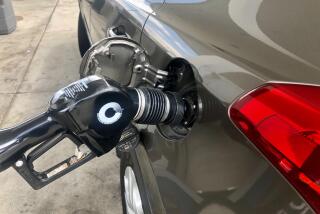Secret Warranties? Maybe, Maybe Not
- Share via
If your car has broken down just after the standard warranty expires and the dealer says he can fix it under a goodwill adjustment, it’s your lucky day in the shop.
But are the dealership and the manufacturer actually executing a so-called secret warranty that involves a defective product without disclosing it?
Secret warranties have long been a hot button for consumer advocates, who say that manufacturers will only begrudgingly cover product defects for customers who complain loudly enough to a dealer. (And anybody going to an independent garage is out of luck.)
The California Legislature attempted to settle this controversy five years ago when it passed a little-noted requirement that auto makers file with the state’s New Motor Vehicle Board a notice of any extended or secret warranty program.
The law is a classic demonstration of how consumer protection programs can sometimes have little effect--if any--other than creating a paper mill for corporate managers and government workers.
“It has been almost a de minimus program,” acknowledged Sam Jennings, chief administrative officer at the board. “It probably didn’t have much impact on consumers.”
The majority of auto makers that have filed notices with the board deny having any warranty programs that would fit the description given under the law.
“Aston Martin Lagonda of North America has not adopted any motor vehicle adjustment programs,” wrote the firm’s customer support manager.
Similar letters were written by AM General, Ferrari, Honda, Kia, Suzuki and Toyota, among others. Notably, Ford and Volkswagen acknowledged having a few such programs, as did General Motors in one instance. Chrysler made no filing at all.
Clarence Ditlow, director of the Center for Auto Safety, has written a book, “Little Secrets of the Auto Industry,” that asserts that secret warranties are widespread.
Ditlow cites as an example a recent notice of a secret warranty on a defective valve design from a European auto maker.
“Claims may be submitted on a one-time basis when there is a documented customer complaint and with authorization by the local regional rep,” said the notice, which was sent to dealerships.
Manufacturers contend, however, that their willingness to make such goodwill adjustments on repairs is not the same as a secret warranty, because it does not represent an across-the-board offer to repair every car in a particular model year.
In the example cited by Ditlow, the key wording is “on a one-time basis,” which means that the repairs are not part of a broad policy.
Honda, for example, notified the New Motor Vehicle Board last year that it has no warranties that require disclosure under the law. But does that mean the company never agrees to pay for a repair when a car is out of warranty?
“It is handled on a case-by-case basis,” said Honda spokesman Jay Joseph. “We certainly comply with the law. We disclose everything.”
*
The warranty law enacted five years ago never empowered or even required the New Motor Vehicle Board to enforce the disclosure provisions, and the Legislature has never provided any funding for the program, Jennings said.
As a result of such weaknesses, said Rosemary Shahan of Consumers for Auto Reliability and Safety in Sacramento, manufacturers are flouting the law and secret warranties are still widespread.
Moreover, consumers are seldom made aware, as required by the law, of how they can obtain service bulletins and other notices of defects, Shahan said.
Indeed, only a handful of consumers ever ask the New Motor Vehicle Board for the notices that auto makers file. The board receives only two or three requests a year, Jennings noted.
*
Times staff writer Ralph Vartabedian cannot answer mail personally but will respond in this column to automotive questions of general interest. Write to Your Wheels, Business Section, Los Angeles Times, Los Angeles CA 90053. Via e-mail: ralph.vartabedian@latimes.com.







